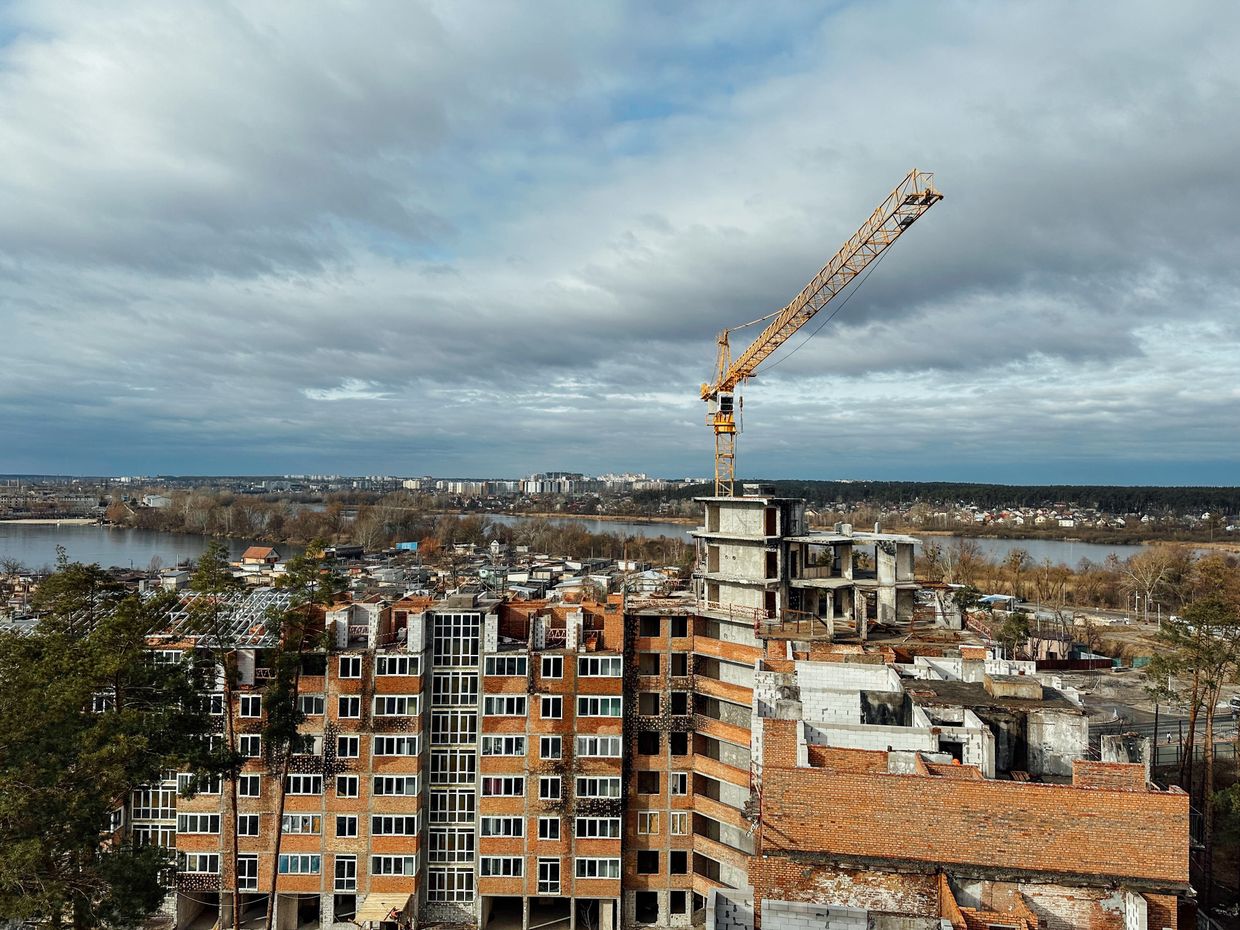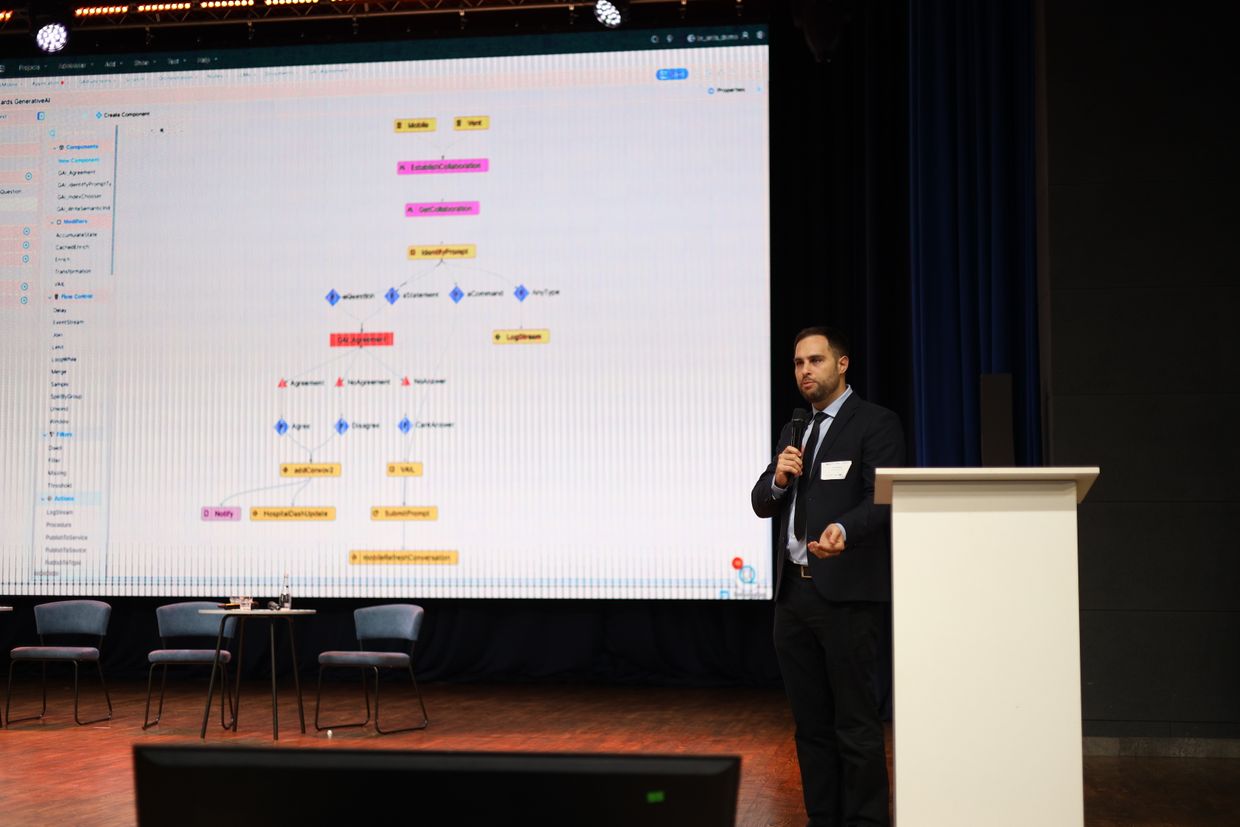Ukraine's small towns see unexpected attention from a US entrepreneur

Volunteers rebuild the roof of a house that was damaged during battles at the start of Russia's full scale invasion, in Novoselivka village on October 30, 2022 in Chernihiv, Ukraine. (Ed Ram/Getty Images)
When Chicagoan Chris Exline decided to expand his furniture rental company to Ukraine, he did not expect to relocate his life to a small town of 20,000 people in Ternopil Oblast.
The businessman and CEO of Home Essentials initially planned to rent furniture to expats and organizations flooding in to help Ukraine’s reconstruction and EU assimilation. The Hong Kong-headquartered company had previously furnished the offices and residents of diplomats and embassies in war zones like Iraq and Afghanistan.
When it became apparent that reconstruction was a long way off, Exline altered his business plan to go beyond his usual clients like USAID, a U.S. governmental aid agency. He opened a store in Kremenets in western Ukraine selling home goods from beds to scented candles with the option to pay in monthly installments through a layaway plan.
While many investors are staying away from Ukraine until the end of the war, Exline has calculated a fruitful blueprint for smaller Ukrainian towns that have historically been ignored by foreign entrepreneurs. He has permanently relocated to Kremenets and has secured a stable client base of local homeowners while also donating mattresses to internally displaced people and soldiers on the front.
“Being based in Kremenets heightened my sensitivity and urgency to saving and creating jobs. That was a primary reason for locating here,” he told the Kyiv Independent in an interview on the sidelines of the Kyiv Mayor’s Summit on Nov. 8.
Exline has since funneled hundreds of thousands of euros into his Ukrainian venture and will launch a factory producing upholstered furniture at the end of the year for the domestic and European markets.
For now, the company has one shop in Kremenets and operations in Kyiv for corporate offices and diplomats. But Exline says there is an opportunity to expand rapidly in the next two years and bring the furniture rental business model to the mainstream, despite initial suspicion from locals.
This interview has been edited for length and clarity.
Kyiv Independent. Why did you choose to open your business in Ukraine?
Chris Exline: Like the entire world, I was shocked on Feb. 24, 2022. Then, four to six weeks later, I was shocked again that Ukraine was not going to capitulate.
Simultaneously, there were estimates of reconstruction costs and EU integration talks. I realized we needed to get in early to be prepared (for reconstruction).
We announced plans to enter the market and started receiving investment profiles from different oblasts in the summer of 2022. I got offers from all these towns with castles and 500-year-old monasteries. I thought, “This is like a Disney movie!”
We knew that reconstruction would be happening in lots of different areas. A primary reason was also to get closer to a supply base. Bringing furniture in from China was a nonstarter because of shipping, cost of logistics, and timing.


We teamed up with a mattress factory in Kremenets, Ternopil Oblast, and were going to buy it but that fell through. I struck a deal with the owner to buy mattresses every month but we didn't really have an outlet to sell them in Kremenets, which is a town of 20,000 people, with 40% unemployment back in October 2022.
The town also had 3,500 IDPs. I arrived on Oct. 3, 2022, and the next day I donated hundreds of mattresses to children who were sleeping on cardboard in a school and their families.
We started the mattress donations and from that period I realized why I should be in Kremenets. The multiplier effect of what we did here would be much greater than if we were in Lviv, Ternopil, or Kyiv.
By February 2023, it was obvious that the pace and scale of reconstruction weren't going to be as anticipated. I had to do something so I opened a Home Essentials store on May 1, 2023 — the first home decor shop in Kremenets.
I hope to open in Kopychyntsi (Ternopil Oblast) and Zolochiv (Lviv Oblast) before the end of the year. Afterward, we're going to open 25 stores within the next 25 months.
Kyiv Independent: How do you find the locations?
Chris Exline: Our staff did an exhaustive study and identified about a hundred towns. In those surveys, we look at the population, employment, the percentage of people on pensions, age, industries, and competitors.
We identified towns all over Ukraine with similar demographics to Kremenets. Right now, it's our preference to do something more concentric and close to a fulfillment center.
Once we have those stores, then we have sales and economies of scale to support our own manufacturing and then we're able to pass those savings on to the customers.
Kyiv Independent: How does your business model work and could it become more commonplace in Ukraine?
Chris Exline: It will be. We've brought in an innovative new way of doing business.
We have zero percent interest, we have no credit checks, it's a two-page agreement, and we don't use any banks.
When I was figuring out how to change the business and align it with market expectations, I looked at a core component of Ukrainian culture, which is not to trust anyone at first. In Kremenets, the fact that I keep coming back again and again has built up trust.
I tailored our business model. We don’t accept cash until we deliver, we have stores so people can come in and see and touch, and we give them certain flexibility.
We never turn their paper over to a bank. We don't ask troubling questions like proof of income, bank statements, or typical things that you would need to get a loan or finance.
When people realize that we're not dependent on a bank and that we do this through our own cash flow, it shows them that we are a strong company.
There was one customer who had a faulty mattress. She was shocked when we replaced it free of charge without an argument. She was expecting a confrontation.
Kyiv Independent: How many people do you currently employ?
Chris Exline: Currently 25. We will easily have 100-150 people when we have 25 stores.
After we realized that the original premise for our market entry was not going to happen, a.k.a. really assisting in reconstruction, I stayed and continued to invest.
I've been here when we went four days without water and I had to use snow to clean plates. I chose to look at business setbacks and business reorientations and adapt. When hostilities cease, Ukrainians are going to know who was here and who is just coming in.
When you're building a brand, people will remember. Had I stayed in Kyiv or Lviv, I wouldn't get a sense of what real Ukraine is going through. I think it's made me a better businessman.
Our brand has very high goodwill with our customer base because we offer a very good service: We deliver on time, we charge less than other people, and we're plowing money back in through charitable efforts and helping those in need. That's why we're growing.
Kyiv Independent: Do foreign investors need to reassess their understanding of business in Ukraine?
Chris Exline: There are a lot of small companies in Europe that want to come in, but they don't have the financial resources. Denmark has a fund for Danish companies, and the same with the Netherlands and Poland.
That business model is flawed. You have to make a business case to bureaucrats in Copenhagen, Amsterdam, and Warsaw, that you're going to come here and make money in doing so. But they're small companies, so they don't really have the resources.
Large companies would never think of asking their government for seed capital or funding to come into Ukraine. They have the resources to do it but they are waiting until the end of the war.
There's also a huge disconnect. Companies don't know how to come in because there's no clarity and no one to talk to.
The Reconstruction Agency’s director (Mustafa Nayyem) tried to attend the Recovery Conference in Berlin on this very subject. But he couldn't leave the country (to attend the conference) and then it took four months to find his replacement.
What kind of message are you sending? You've got all these people in Berlin, wanting to talk to the head of restoration, and he's not allowed to leave the country.


The Kyiv Independent: How do you assess the business environment in Ukraine for foreign investors?
Chris Exline: I think the opportunities for foreign investors are enormous and our (furniture rental) market is going to be very big. I would find it extremely hard to justify being here if the market was only in the tens of millions.
I believe that our businesses in Ukraine could eclipse the businesses that we've had combined over the past 25 years.
If I see an opportunity in this small niche of furniture retail in towns of about 20,000 people in Ukraine, what are all the other opportunities that people can do?
I'm here because of the sacrifices of 2003, 2014, and obviously today. I know that Ukraine, no matter what happens, is never going back into a Russian system.














